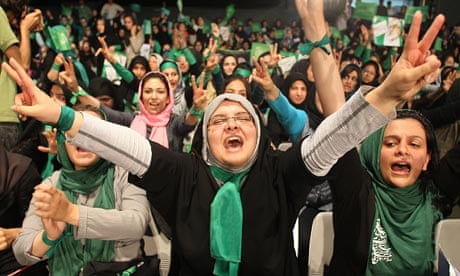Rising political tensions in Iran ahead of watershed presidential elections on 12 June intensified today with the discovery of a homemade bomb on board a domestic airliner. The incident closely followed a fatal attack on a mosque that hardline Iranian leaders blamed on the US, Israel and Britain.
Iranian news reports said the device was found shortly after a Tehran-bound Kish Air flight with 131 passengers on board took off from Ahvaz, in Khuzestan province in south-west Iran. The bomb was defused after the plane made an emergency landing, Fars news agency said.
Irna, the official Iran news agency, said only that there had been a plot against the flight. "The plot … was unsuccessful due to the security forces' awareness and those behind it were arrested," it said.
The Ahvaz incident followed an apparent suicide bombing on Thursday at a mosque in Zahedan, in Sistan-Baluchistan province in south-eastern Iran, which killed 25 people and wounded more than 100. Three men convicted of planning the explosion were publicly executed yesterday.
Khuzestan and Sistan-Baluchistan provinces have witnessed numerous attacks attributed to separatists, ethnic and religious groups, and mujahideen resistance fighters since the 1979 revolution. Oil-rich Khuzestan, which borders Iraq, is home to Iran's Arab minority. Sistan-Baluchistan, bordering Pakistan, has a high concentration of Sunni Muslims. Iran is predominantly Shia.
A Sunni opposition group known as Jundullah (God's Soldiers), which Iran links to al-Qaida and the US, claimed responsibility for the mosque bomb. But it said the men executed yesterday were all in jail when it happened and had nothing to do with it.
The Saudi-owned al-Arabiya television said a man claiming to represent Jundullah called it saying the bombing was a suicide attack aimed at Basiji forces, a religious militia, that were meeting in the mosque to co-ordinate election strategy.
Iran's leaders have repeatedly blamed US and Israeli "spy agencies" for arming and assisting insurgent groups, including dissident Kurds living in western Iran. They say the aim is to destabilise Iran and promote regime change.
Jalal Sayyah, a spokesman for the governor's office in Sistan-Baluchistan, repeated the accusation after the mosque attack. "The terrorists, who were equipped by America in one of our neighbouring countries, carried out this criminal act in their efforts to create religious conflict and fear and to influence the presidential election," Sayyah told state radio.
Ayatollah Ali Khamenei, Iran's supreme leader and a strong, public backer of President Mahmoud Ahmadinejad's bid to win a second term, added his weight to the claims. "No one can doubt that the hands of … some interfering powers and their spying services are bloodied by the blood of the innocent," he said.
Major General Hassan Firouzabadi, Iran's armed forces chief of staff, also blamed outside forces, pointing the finger at Britain in particular. "The attempts made by colonialism, Zionism and on top of them England for sowing discord between Shias and Sunnis have yielded no result," he said.
Robert Gibbs, the White House spokesman, said President Barack Obama "strongly condemns" the Zahedan attack and other acts of terrorism inside Iran. "The American people send their deepest condolences to the victims and their families. No cause justifies terrorism, and the United States condemns it in any form," he said.
Any direct or indirect US involvement in fomenting pre-election tensions is considered unlikely, given Obama's new policy of engagement with Iran. Israel, which believes Iran poses an existential threat, takes a harder line.
Analysts suggest that hardline conservatives who back Ahmadinejad against the main reformist presidential candidate, Mir Hossein Mousavi, may try to use such incidents to whip up anti-American and anti-western sentiment.
Mousavi has adopted a more conciliatory approach to the controversy over Iran's nuclear programme and is seen in the west as a more promising interlocutor than the often confrontational Ahmadinejad.
Unconfirmed reports published in the US last year said the Bush administration obtained $400m in "off-the-books" congressional funding to finance covert operations aimed at assisting minority Ahwazi Arab and Baluchi groups and other dissident organisations inside Iran. It is unclear whether these alleged operations have continued since Obama took office.
In April, Iran's intelligence ministry said it had arrested a group of people linked to Israel who were planning bombings before the election.
Apparently concerned about the potential for internal ethnic and religious strife as the polls approach, Khamenei issued an appeal for unity. "The continued solidarity of all Iranian peoples and different political streams in defending the flag of Islam in Iran is necessary and guarantees a bright future for the nation," he said last month in Bijar, in western Kurdistan province.
